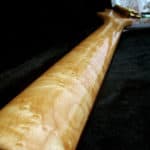Have you ever felt that some guitars are more comfortable than others?
Sometimes it happens that an instrument is super comfortable to play but when you pick up a different one it is impossible to strum a simple C major chord.
This can happen for different reasons, some guitar players blame the space between strings, and others say it is due to the excessive height of the strings but these are not the most common reasons.
Although you may find it hard to believe, it is usually due to the size of the neck.
If you feel uncomfortable playing easy chords or running scales along the fretboard, it could be that your guitar neck is too thick for you. This usually happens to those who have small hands or fingers that are a little short.
Luckily, we are here to help you better understand why this happens.
In this article, we will explain the pertinent aspects of dealing with this type of problem and a handful of solutions.
Is it possible for a guitar neck to be too thick for your hands?
Since players’ hand sizes vary as much as neck thicknesses do, some guitarists may feel that their guitar necks are uncomfortable.
Bulky instruments typically present a longer scale length which results in thicker necks.
Musicians may think that a guitar neck is too thick due to several reasons. In the first place, the size of their hands.
As mentioned earlier, guitar players with small hands in most cases struggle with bigger necks.
The same happens to players with short fingers, they could feel that some sections in the fretboard are truly tough to reach.
In addition, an extremely thick neck could be harmful to the player.
Is not that common but in some cases, it might lead to arthritis, something that every musician wants to avoid.
What is more, guitar necks have different widths and shapes which can also play an important role in the feel when playing them.
Necks with U-shapes are the ones that bring the most difficulty to guitar players with little hands.
What to do if your guitar has a thick neck you don’t like?
That an instrument does not fulfill the player’s expectations is more common than you might think and can occur for a variety of reasons.
The main aspects why musicians don’t like a thick neck can be comfort, playability, and tone.
Fortunately, you could make various changes to your instrument.
The easiest and fastest solutions, with certain guitar models, are replacing the guitar neck with a thinner one or just getting a guitar with a different neck profile.
Although those options are proper alternatives, aren’t the cheapest ones.
Therefore, you can have your guitar neck reshaped.
That process consists of changing the neck thickness using woodwork. You may think that might ruin your instrument rather than improve it but is not like that.
Changing a neck thickness is more usual than thought.
If you want to know more about reshaping a guitar neck go and check our article covering that topic.
Last but not least, you can give your guitar a second chance and try to get on well with it.
Although the neck width could not meet your expectations, you can get accustomed to it (more on that later!).
Can you get used to a guitar with a very thick neck?
Getting used to an uncomfortable neck could be rather hard but not impossible.
For players with small hands and short fingers could be even more complicated but still achievable.
It might be also helpful when going to a thinner neck profile, you will handle it better and you’ll feel your fretting hand fly along the fingerboard.
For those who have bigger hands or broader fingers, it wouldn’t be difficult at all, you can get used to the neck easily through a couple of practice sessions.
However, a thick neck will influence the way you play and will also affect the techniques you use.
Players who prefer fretting with their thumb instead of using barre chords may find thick necks uncomfortable and hard to play.
Therefore, it will always depend on the player, what is simple for someone could be unbearable for others.
If you sit and put in the hours it will take time but you will achieve it.
Can you swap the neck of your guitar if you don’t like it?
Adapting yourself to be a better match for the instrument is great but most players prefer that the guitar fits the musician and not the other way around.
In that situation, one available option would be to replace the neck of your guitar with a different one.
This procedure is very common with bolt-on necks.
In that way, you can find the comfort and freedom you were looking for.
Nevertheless, some issues must be considered.
First of all, not every neck matches every guitar body so you have to pay attention not only to the neck pocket shape but also the width.
What is more, the number of bolts should be the same, otherwise, your instrument will need extra routing or some woodwork to adapt it to the new neck.
If you are a Fender player you can take a look at one of our articles.
There you will find different Fender necks known to be interchangeable.
Can you sand down a thick guitar neck to make it thinner?
Perhaps you already know the answer to this question because we have mentioned it before.
Apart from swapping necks, you could remodel the neck of your instrument.
When remodeling any guitar component is suggested to see a luthier or a tech.
They are professionals who are specialized and used to doing that kind of job.
If you have experience and feel comfortable doing woodwork you could be able to do this task.
However, in most cases is impossible to know at which depth the truss rod is located.
That’s why going for a professional is always recommended.
In short, reshaping a thick neck is always welcome and a good alternative if you don’t want to change your neck.
Is it worth it modifying the neck of your guitar?
Although some people say that putting your guitar neck through this process will not be worth it and will ruin your guitar, modifying it is a good option, in fact, it is quite common.
As we usually say in these cases, the musician’s preferences and expectations will always have an influence.
For some, it will be a waste of time while for others it will be an extraordinary solution.
It is important to note that while this alternative may be useful to you, it has some limitations.
First of all, it is a destructive task, meaning that you will not be able to go back to the previous design.
Another reason to consider is the performance of the neck.
Being one of the fundamental parts of the guitar, by modifying its size you will also be altering the resonance, sustain, and tone of the neck.
Again, we suggest that a specialist should be consulted when carrying out these works.
Ask them and explain what result you want to obtain and they will tell you which option is the best in each case.

Hello there, my name is Ramiro and I’ve been playing guitar for almost 20 years. I’m obsessed with everything gear-related and I thought it might be worth sharing it. From guitars, pedals, amps, and synths to studio gear and production tips, I hope you find what I post here useful, and I’ll try my best to keep it entertaining also.





